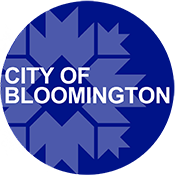
BLOOMINGTON – City of Bloomington Mayor John Hamilton announced Tuesday that, following months of research, planning, and preparation, 304 locations in four different project areas in Bloomington have been identified to provide a more equitable urban canopy for all residents. These projects are part of the continuing Bicentennial Bond program the City Council and administration sponsored to invest in the future, in honor of our 200th birthday in 2018.
The four project areas were identified using a combination of data from the City of Bloomington Canopy Report and the United States Census American Community Survey, including existing canopy, potential canopy, median income, and percent non-white population. The selection of the four project areas was corroborated by areas identified by the American Forests Tree Equity Score mapping project of areas with lower “tree equity” scores.
Neighborhoods in the Bicentennial bond tree planting areas include:
- Project Area 1: Green Acres
- Project Area 2: Hoosier Acres, St. James Woods
- Project Area 3: Crescent Bend, Crestmont, Maple Heights, Near West Side, Pigeon Hill, Prospect Hill, Trail View, Waterman, 6th & Ritter
- Project Area 4: Barclay Gardens, Broadview, Evergreen Village, Moss Creek, Pinestone, Rockport Hills, Southern Pines, Timber Ridge, Walnut Creek, Winslow Farms
Urban forests across the United States are often unequally distributed, with higher-canopied neighborhoods linked with higher income and a higher percentage of white populations. To address gaps in Bloomington’s canopy, the Bicentennial bond tree planting is focused in areas identified by both their environmental and socio-economic characteristics.
Sites that have been identified as appropriate places to plant either small, medium or large-size trees are listed by street address on the project website at bloomington.in.gov/about/trees/bicentennial-bond-project.

“As the City continues to grow and diversify its urban canopy in the face of climate change, we recognize that this canopy growth must be implemented equitably so that all residents benefit from the improvements made to health and quality of life,” said Mayor John Hamilton. “I want to thank the Parks and Recreation staff for their hard work and dedication to all of our residents and our invaluable natural environment.”
The Board of Park Commissioners will review a contract for the purchase and planting of these trees as early as their regularly scheduled February meeting.
A series of Bicentennial bond projects, including $800,000 to plant trees along streets and in public rights-of-way across the city, was announced in 2018. Potential planting sites were identified by Davey Resource Group in 2019 as part of a city-wide inventory of street trees.
Bloomington Parks and Recreation’s urban forestry program staff are hosting a series of online community feedback and information sessions in February.
Friday, Feb. 11 from 5:30-7 p.m., via Zoom
Meeting link: https://bloomington.zoom.us/j/81886798135?pwd=M1dtNEVMaVdMbjhJVk16dXRaUk03UT09
Monday, Feb. 21 from 5:30-7 p.m., via Zoom
Meeting link: https://bloomington.zoom.us/j/83600242699?pwd=SUhqWXZxMW54VXFXVTBWRWhTY3B2UT09
During these sessions, the city’s urban forester will explain the process for selecting the tree-planting sites, and answer questions from neighbors about when and how the trees will be planted, what species of trees will be planted, and where, and how to provide feedback regarding the tree planting process.
Community members may also provide feedback about the proposed planting sites online at bloomington.in.gov/about/trees/bicentennial-bond-project, or by phone at 812-349-3716. The deadline to receive feedback regarding tree planting locations is Feb. 28.
Trees will be planted at no cost to property owners. Bloomington Parks and Recreation will also provide tree maintenance, such as mulching and pruning, as needed. Tree planting is scheduled to begin as early as spring 2022.



